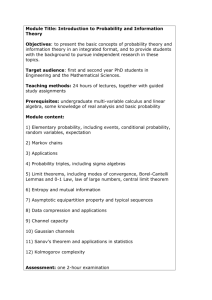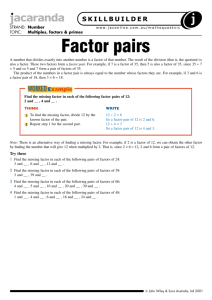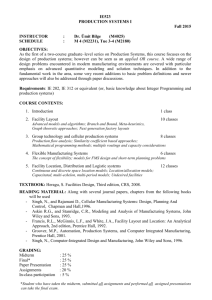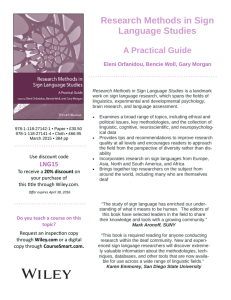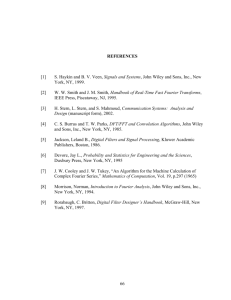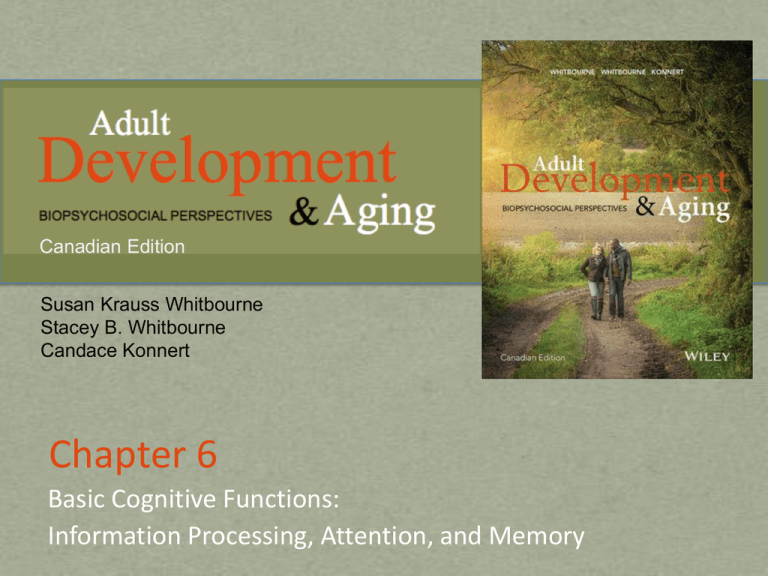
Canadian Edition
Susan Krauss Whitbourne
Stacey B. Whitbourne
Candace Konnert
Chapter 6
Basic Cognitive Functions:
Information Processing, Attention, and Memory
Processing speed and attention
Wiley Canada
Push f button
on keyboard
when you see
red “N”
Simple reaction time task
Make response as soon as
target appears
Choice reaction task
Make one response for one
stimulus and another for a
different stimulus
Push f button
on keyboard
when you see
red “N” and j
button when
you see green
“N”
Wiley Canada
General slowing hypothesis proposes loss of speed in nervous
system is main cause of poorer information processing
As the task becomes
more difficult older
adults take MUCH
longer
Source: Sliwinski, M. J., & Hall, C. B. (1998). Constraints on general slowing: A meta-analysis using hierarchical linear models with random coefficients. Psychology and Aging, 13, 169. American
Psychological Association. Reprinted with permission.
Wiley Canada
Processing speed and attention
Visual search tasks require that observer locate a specific target among
set of distractors.
Wiley Canada
There are two contrasting approaches to aging and attention
Wiley Canada
Studies on video games are showing attentional advantages:
Young adults:
Improved attentional capacity
Faster reaction time
Peripheral attention
Ability to process rapidly changing stream of information
Keeping track of multiple targets
Improving Useful Field of View
Older adults:
Newer studies showing benefits as well
Wiley Canada
Driving and Aging
Wiley Canada
Wiley Canada
Younger vs. older drivers:
Younger drivers:
+ Have faster response times
- More likely to drink and drive
- More likely to drive while distracted
Older drivers:
+ More experience
+ Self-regulate
- Difficulty with left turns
- Difficulty merging or yielding
Wiley Canada
Wiley Canada
Biopsychosocial view of driving and aging
Psychology
Internal distractions
causing anxiety
Biology
Changes in vision and
reaction time
Sociocultural
Driving necessary to live
independently
Wiley Canada
Figure 6.5
CAA Simple
Driving
Assessment
for Seniors
Wiley
Canada
Source: Canadian Automobile Association.
(n.d.).
Seniors Driving Simple Driving Assessment. Retrieved
from http://seniorsdriving.caa.ca/wp-content/uploads/pdfs/en/Simple%20Driving%20Assessment.pdf
Figure 6.5
CAA Simple
Driving
Assessment
for Seniors
Source: Canadian Automobile Association. (n.d.). Seniors Driving Simple Driving Assessment. Retrieved
from http://seniorsdriving.caa.ca/wp-content/uploads/pdfs/en/Simple%20Driving%20Assessment.pdf
Wiley Canada
Figure 6.5
CAA Simple
Driving
Assessment
for Seniors
Source: Canadian Automobile Association. (n.d.). Seniors Driving Simple Driving Assessment. Retrieved
from http://seniorsdriving.caa.ca/wp-content/uploads/pdfs/en/Simple%20Driving%20Assessment.pdf
Wiley Canada
Aging airline pilots may be safer
• Fewer accidents (fatal and nonfatal)
• Take better advantage of training sessions
• More likely to identify complex situations
Air traffic controllers may also benefit
from their greater experience
Wiley Canada
Memory
Wiley Canada
Wiley Canada
Wiley Canada
Brain’s default network in older adults
Decreased activation and less deactivation
during memory tasks
However, high-functioning older adults may
be able to draw on default network during
working memory tasks
Wiley Canada
Effects of Aging on Long-Term Memory in Adulthood
Wiley Canada
Aging and long-term memory scorecard
Abilities that decline
Abilities that do not
decline
Episodic memory
Source memory
False memory
Tip-of-the-tongue (names)
Prospective memory
Flashbulb memory
Semantic memory
Procedural memory
Implicit memory
Autobiographical memory
(“reminiscence bump”)
Source: image100/Age Fotostock America, Inc.
Wiley Canada
Social Cognition and Aging
Wiley Canada
Identity, Self-Efficacy, Stereotype Threat,
and Control Beliefs
Source: DNY59/iStockphoto
Stereotype threat: an evoked fear of being judged in accordance with
a negative stereotype about a group of which you belong
Wiley Canada
Memory is also related to health-related behaviors in
middle and later adulthood
Cigarette smoking
Poorer memory among smokers
and former smokers
Exercise
Positive benefits of aerobic
exercise and strength training
Consumption of fish
Lower rate of cognitive decline in
fish eaters
Metabolic factors
Lower levels of IGF-1 associated
with better memory
Dietary intake of:
Vitamins B12, B6, and folate
Homocysteine, or meat (negative)
Flavonoids including chocolate
Emotions
Stress and depression can interfere
with memory performance
Gingko boloba
No benefits
Sleep
Related to better memory but only
in young adults
Wiley Canada
Memory training studies show benefits for older adults
•
•
Strategy training
Support during encoding
•
•
Training that taps into areas of expertise
Method of loci training altered white matter density
Source: Optale, G., Urgesi, C., Busato, V., Marin, S., Piron, L., Priftis, K., . . . Bordin, A. (2010). Controlling memory impairment in elderly adults using virtual reality
memory training: A randomized controlled pilot study. Neurorehabilitation and Neural Repair, 24, 348–357. doi: 10.1177/1545968309353328. Reprinted by Permission of
SAGE Publications.
Virtual reality helped older adults by simulating walking through various destinations
while playing soothing music.
Wiley Canada
ACTIVE study
•
•
•
•
2800 adults 65-94
2 year period, 10 sessions, 1 hour each, 5-6 weeks
Memory, reasoning, or speed of processing
Improvements shown by 87% (reasoning), 74% (speed), and
26% (memory)
• Gains maintained for 2 years (and counting)
Wiley Canada
Copyright
Copyright © 2015 John Wiley & Sons Canada, Ltd. All rights
reserved. Reproduction or translation of this work beyond
that permitted by Access Copyright (The Canadian Copyright
Licensing Agency) is unlawful. Requests for further
information should be addressed to the Permissions
Department, John Wiley & Sons Canada, Ltd. The purchaser
may make back-up copies for his or her own use only and
not for distribution or resale. The author and the publisher
assume no responsibility for errors, omissions, or damages
caused by the use of these programs or from the use of the
information contained herein.

